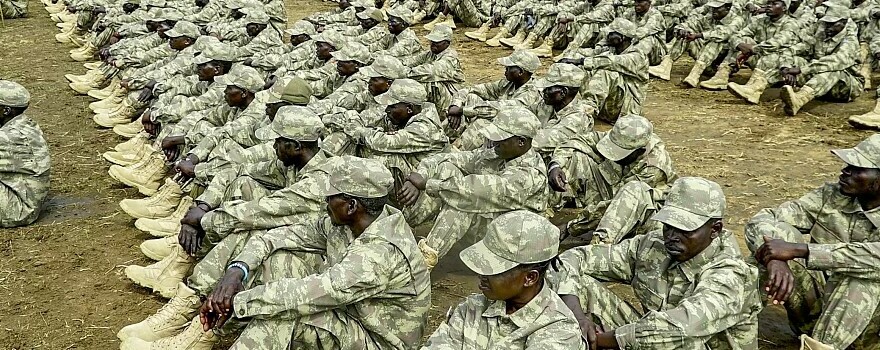Around 683 Unified Forces from the South Sudan People’s Defense Forces (SSPDF) have recently arrived in Torit, the capital of South Sudan’s Eastern Equatoria State, gearing up for deployment to various border posts. The move is part of the national border security initiative to safeguard the borders that Eastern Equatoria State shares with Uganda, Kenya, and Ethiopia.
Addressing the Unified Force contingent, Maj. Gen. Angong Angom, the SSPDF Division 7 Commander, emphasized the importance of their mission in protecting the territorial integrity of South Sudan. He urged them to focus on their duty of defending and safeguarding the border of Eastern Equatoria State, reminding them to steer clear of tribal politics.
Angom stated, “Your responsibility is to protect the border of Eastern South Sudan or Eastern Equatoria State. We don’t want divisions based on tribal affiliations. You are soldiers for the country, specifically for South Sudan. Your task is to protect South Sudan without getting involved in any secretive matters. Without soldiers, this country wouldn’t exist today. Let’s reevaluate our mandate and concentrate on the essential work of safeguarding South Sudan.”
He emphasized, “Soldiers of South Sudan, your duty is to serve South Sudan. Regardless of your origin, you are a son of South Sudan, and you must contribute to your country. Your presence at this parade is in support of our governor, as you have been deployed in his administration. The governor oversees the borders of our country, and you are here in these border areas. Another force will join to ensure that those who encroached on our borders return to their places beyond our international borders.”
Eastern Equatoria State Governor Louis Lobong Lojore, in his address to the SSPDF Unified Force, congratulated them for their deployment to the border state and simultaneously cautioned against engaging in politics. He expressed gratitude to President Salva Kiir and other parties for their commitment to implementing the Revitalized Agreement on the Resolution of the Conflict in South Sudan (R-ARCISS).
Addressing the forces, Governor Lobong emphasized the dual challenges they face, stating, “You are here for two adversaries. Although there is currently no conflict among us, we are still grappling with challenges, as you’ve been briefed. As soldiers, your primary role is to protect the country. South Sudan is your topmost responsibility, encompassing its citizens and resources. This is why you wear the military uniform. Eastern Equatoria State, with its three borders, relies on you to safeguard these borders. Your counterparts from other countries are stationed there, but our absence has led to fear among our civilians. They retreat from the border because their soldiers and government are not present to protect them, resulting in the theft of their properties.”
Governor Lobong emphasized, “It’s important to understand that we are one nation, South Sudan, under one president and one unified command for the army, police, and other forces. We operate under a single government serving all South Sudanese. As you come here, there is no differentiation based on political parties. Our common adversaries are the criminals engaging in activities such as stealing cows, abducting children, committing highway robberies, and breaking the law. These are our primary enemies, and it is crucial for us to address these challenges as our number one priority.”
Susan Bosco, a Torit resident, expressed her appreciation for the deployment but emphasized the need for protection within the town itself due to rising crime rates. She stated, “While we see the benefits of the deployment, it would be even better if some soldiers could be stationed in the town. We are facing numerous crimes, and many of our children have joined gangs. During the night, these gangs operate in groups, and if the soldiers are trustworthy individuals, having some stationed in town would be reassuring. However, at the moment, we are uncertain about their character, and whether they are beneficial or not.”
Susan also conveyed her concerns about the presence of soldiers in civilian settlements, citing past instances of inappropriate behaviour by some individuals in uniform.
“I am concerned about the proximity of soldiers to civilians, as it often brings about a different lifestyle. Unfortunately, there are instances where some soldiers engage in criminal activities, including assaulting women during their night duties. If soldiers are here to genuinely protect civilians, it’s crucial that they respect and safeguard citizens while maintaining a harmonious relationship with the community. It is essential to avoid any conflicts between different communities. We are aware that excessive alcohol consumption can lead to issues among soldiers, so it’s important for them to exercise moderation and refrain from excessive drinking,” shared Susan, expressing her apprehensions.
Dusman Asunta, another resident, expressed mixed feelings, saying, “We are pleased, but at times, there’s a sense of fear when we witness individuals carrying guns in front of us. On the flip side, we understand they are here to enhance our security. Currently, the government’s decision to deploy soldiers near the border areas for safeguarding is commendable. However, it would have been better if they had informed citizens beforehand. This proactive communication would have helped people living along the border areas understand the purpose of bringing in soldiers, alleviating any unnecessary fear.”
Hundreds of unified forces were deployed at a long-overdue ceremony on 15 November, marking progress for the country’s lumbering peace process.
The unification of forces was a key condition of the 2018 peace deal that ended a five-year conflict in which nearly 400,000 people died.
To contact Radio Tamazuj with comments, news tips or information, write to radiotamazuj@gmail.com or use the contact form.




